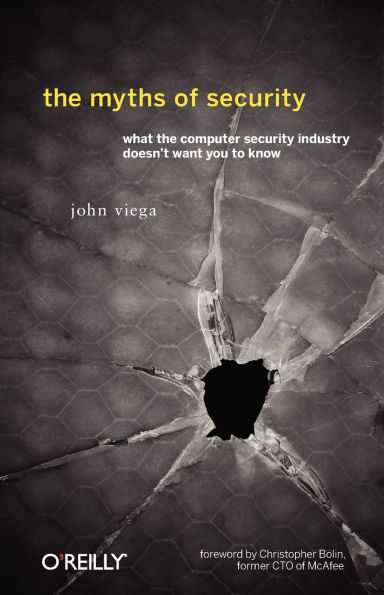The Myths of Security: What the Computer Security Industry Doesn't Want You to Know
If you think computer security has improved in recent years, The Myths of Security will shake you out of your complacency. Longtime security professional John Viega, formerly Chief Security Architect at McAfee, reports on the sorry state of the industry, and offers concrete suggestions for professionals and individuals confronting the issue.
Why is security so bad? With many more people online than just a few years ago, there are more attackers — and they're truly motivated. Attacks are sophisticated, subtle, and harder to detect than ever. But, as Viega notes, few people take the time to understand the situation and protect themselves accordingly. This book tells you:
1110832445
Why is security so bad? With many more people online than just a few years ago, there are more attackers — and they're truly motivated. Attacks are sophisticated, subtle, and harder to detect than ever. But, as Viega notes, few people take the time to understand the situation and protect themselves accordingly. This book tells you:
- Why it's easier for bad guys to "own" your computer than you think
- Why anti-virus software doesn't work well — and one simple way to fix it
- Whether Apple OS X is more secure than Windows
- What Windows needs to do better
- How to make strong authentication pervasive
- Why patch management is so bad
- Whether there's anything you can do about identity theft
- Five easy steps for fixing application security, and more
Provocative, insightful, and always controversial, The Myths of Security not only addresses IT professionals who deal with security issues, but also speaks to Mac and PC users who spend time online.
The Myths of Security: What the Computer Security Industry Doesn't Want You to Know
If you think computer security has improved in recent years, The Myths of Security will shake you out of your complacency. Longtime security professional John Viega, formerly Chief Security Architect at McAfee, reports on the sorry state of the industry, and offers concrete suggestions for professionals and individuals confronting the issue.
Why is security so bad? With many more people online than just a few years ago, there are more attackers — and they're truly motivated. Attacks are sophisticated, subtle, and harder to detect than ever. But, as Viega notes, few people take the time to understand the situation and protect themselves accordingly. This book tells you:
Why is security so bad? With many more people online than just a few years ago, there are more attackers — and they're truly motivated. Attacks are sophisticated, subtle, and harder to detect than ever. But, as Viega notes, few people take the time to understand the situation and protect themselves accordingly. This book tells you:
- Why it's easier for bad guys to "own" your computer than you think
- Why anti-virus software doesn't work well — and one simple way to fix it
- Whether Apple OS X is more secure than Windows
- What Windows needs to do better
- How to make strong authentication pervasive
- Why patch management is so bad
- Whether there's anything you can do about identity theft
- Five easy steps for fixing application security, and more
Provocative, insightful, and always controversial, The Myths of Security not only addresses IT professionals who deal with security issues, but also speaks to Mac and PC users who spend time online.
29.99
In Stock
5
1

The Myths of Security: What the Computer Security Industry Doesn't Want You to Know
238
The Myths of Security: What the Computer Security Industry Doesn't Want You to Know
238
29.99
In Stock

Product Details
| ISBN-13: | 9780596523022 |
|---|---|
| Publisher: | O'Reilly Media, Incorporated |
| Publication date: | 06/29/2009 |
| Pages: | 238 |
| Product dimensions: | 5.50(w) x 8.40(h) x 0.70(d) |
About the Author
From the B&N Reads Blog



